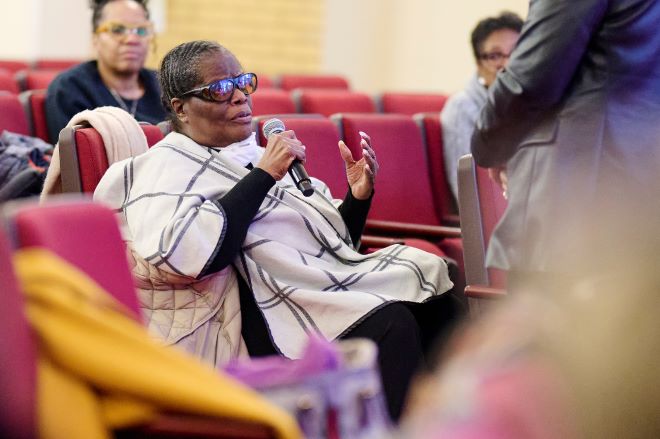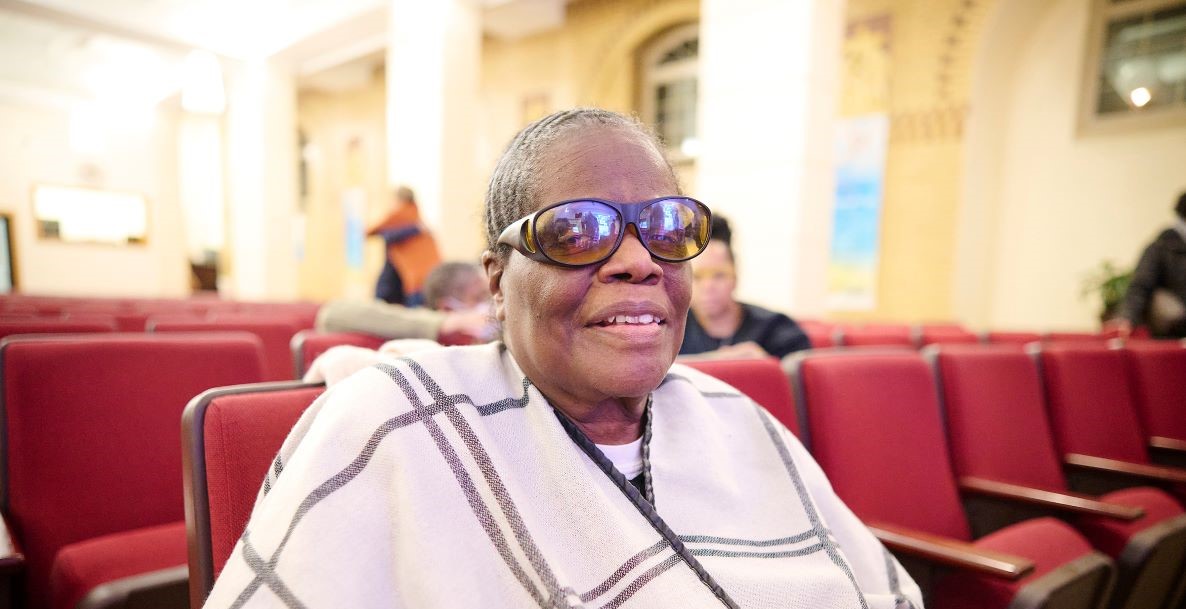When Yvonne Hughes was diagnosed with retinitis pigmentosa, an incurable genetic eye disease that leads to vision loss, she was 26 years old and a married mother of five-year-old twins. “I remember leaving Wills Eye Hospital that day and it seemed like everything around me, even all the traffic, had just stopped. I went back to work and went into the bathroom and broke down,” she recalled.
Now there was an explanation as to why the icons on the computer screen seemed to dance around. She later learned she had other family members with the same condition. Less than a month later, her vision was reduced to what she describes as “seeing shadows.”
In a moment, Hughes’ entire life had shifted from the future she had envisioned — literally. Yet 40 years later, she can’t imagine being anywhere else. Today, she is one of Philadelphia’s foremost unsung champions for people with disabilities, in recovery, needing shelter, who are hungry, and seeking better educational opportunities. She advises the City and the Commonwealth, serves Philly communities through churches, organizes resource fairs for seniors, and has become a trusted friend to countless locals in need.
“I never thought that losing my sight would be how doors opened for me,” she says. For this, Hughes gives credit to God — “It was my faith that kept me.” Still, there’s no denying: Yvonne Hughes is a force of nature unto herself.
Turning a gift into a career
Two years after her diagnosis, Hughes left her sales job at KYW, lost her home, and moved her family in with relatives. A longtime Sunday school teacher, she began volunteering at the Christian school where her then seven-year-old twins were students. She thrived in a school setting and, with training and scholarship support from the Bureau of Blind and Visual Services (BBVS), decided to turn a volunteer position into a full-fledged career.
“I was determined not to quit. I knew there had to be a way to do things I needed to do.” — Yvonne Hughes
BBVS referred Hughes to Blind Industries and Services of Maryland (BISM), where she’d live and learn life and professional skills — while wearing sleep shades. Like most BISM students, she expected to stay months. But her instructors were so impressed with her demonstrated independence, they sent Hughes home after six weeks. From there, she went on to enroll as an undergraduate in education at Eastern University.
Meanwhile, Yvonne Hughes was becoming an adept self-advocate. When BBVS denied her additional services, she successfully appealed through the Client Assistance Program (CAP), which advocates for people with disabilities ensuring they are not discriminated against and that they receive services as mandated by the Rehabilitation Act.
When she started at Eastern, there were no paratransit services available, so she commuted during early mornings to avoid crowds. On campus, she learned to navigate the hills and lack of sidewalks. And, through hours of daily practicing, Hughes learned touch typing using a screen reader so she could complete her assignments.
It took over a decade — and sometimes meant repeating a class or two — but Hughes received her degree in 2007. “I was determined not to quit,” she says, “I knew there had to be a way to do things I needed to do.”
Moreover, she knew if she could achieve, she could help others do the same.
For Hughes, teaching had its own rewards, but she felt driven to help communities outside of school walls.

A voice for people with disabilities in City Hall
One of her first destinations: Monthly meetings for the City’s Commission for People with Disabilities, which back then, fell under the City’s Department of Human Services. In these meetings, Hughes heard firsthand the challenges facing people with disabilities, from dishonest caregivers to employment discrimination to parents unaware of services available for their special needs child. It was an education for Hughes on how agencies should be serving their communities.
Amy Nieves is the former executive director of the Mayor’s Commission for People With Disabilities (MCPD). She met Hughes years before assuming her current role, when she was a volunteer for the PA Developmental Disabilities Council. (Nieves is now with the U.S. Access Board, an independent federal agency that promotes equity for people with disabilities.)
“When I first met Miss Yvonne, she had a long list of concerns — and she was also very discouraged,” Nieves says. Hughes, then a board member on the Pennsylvania Statewide Independent Living Council, was helping to connect people with housing resources, special educational needs and employment discrimination. Hughes shared with Nieves some of the grievances she was hearing. Once Nieves began to “chip away” at Hughes’ list, “I started to see the light come back,” she says.
In 2021, Nieves asked her to join the MCPD as one of its commissioners, who are volunteers with a variety of physical and intellectual disabilities and the spectrums in-between who serve as representatives for their respective disability communities in order to offer cross-disability representation.
The most recent U.S. Census estimates 13 percent of all Philadelphians live with one or more disabilities, as compared to 10 percent of all Pennsylvanians. (The Center for Disease Control has a more expansive definition of disability and cites numbers twice as high.) Nationally, according to a 2023 Pew Research study, the disability rate nearly doubles at age 65 and more than triples after age 75.
“If you don’t tell your story, no one will ever know. A closed mouth will never get fed.” — Yvonne Hughes
“I told her, ‘We need your voice,’” Nieves says, adding that she joked, “If I don’t see your application, you’re not calling me any more for help.” Hughes joined the commision, representing the blind and visually impaired community. Last year, she was elected Vice Chair.
Hughes came to the position with a clear mission: “I want us [all commissioners across all municipal departments] to come together. Too many times, people operate in silos. For example we can’t address just SEPTA, but what about those of us that use the paratransit system?”
Together, “We can show up before City Council and make some noise,” she says.
Beyond the Commission for People with Disabilities
In her early days of advocacy, Hughes relied on the now-defunct Equal Partners In Change (EPIC) to connect her with people in need. EPIC not only held neighborhood meetings throughout the city, they also offered a leadership training program that Hughes completed the same year she earned her bachelor’s degree. Hughes won first place for her EPIC project assignment on truancy.
“If there was a community meeting somewhere, you would find me there. And I always asked questions. I can tell when someone doesn’t understand something, and I make sure I ask questions for them,” she says.
One of her first formal advocacy positions was at the now-defunct Bridgeway, a non-profit that offered recently released citizens employment resources and training and directed low-income single mothers to food and housing programs.
Last year, Hughes launched Showing Community Other Perimeters of Education (SCOPE), a series of summits designed, she says, to “educate senior citizens about government, non-profit, medical and mental health services.” In 2023, she organized seven such gatherings at senior centers, churches and recreational centers around the city. Each brought up to 50 seniors and 20 vendors of services. Her plans for 2024 include summits throughout the surrounding counties. Meanwhile, through Philly iHub, Hughes is developing a business plan to secure a building that will serve as SCOPE’s permanent headquarters.
This year, Governor Shapiro appointed Hughes to the Special Education Advisory Panel (SEAP), a state-level advisory group to the Secretary of Education and the Department of Education. SEAP advocates for students with disabilities with members serving a three year term. Hughes sits on the family engagement committee and is currently working on a resource packet for parents.
“I never thought that losing my sight would be how doors opened for me.” — Yvonne Hughes
Hughes is also part of the Mid-Atlantic ADA Center’s leadership training program. Director Ann Deschamps recalls that when the organization was seeking a project focus group, Hughes almost effortlessly gathered about 60 people to participate.
Since 2011, Hughes has worked with the North Philly-based grassroots organization It’s Not Your Fault, a non-profit under Genesis Ministrie. The group serves food to anyone in need and provides resources on housing and recovery.
Dorothea Wayne remembers meeting Hughes more than 10 years ago, when she was experiencing addiction and food insecurity. Hughes connected Wayne with other churches that offered free food and introduced her to Genesis Ministries’ recovery program.
Those resources were essential, Wayne says, but it was Hughes’ belief in her that made all the difference. Now married and clean for three years, she refers to Hughes as her “spiritual advisor” and friend.
As she directs people to resources, Hughes also encourages them to speak up. “If you don’t tell your story, no one will ever know. A closed mouth will never get fed,” she says, “I want to know their rights and to stand up for themselves. I want to train them to do my job.”
“My focus is to educate and empower people to know their rights and to stand up for themselves. I want people to know they are victors not victims,” she says, “This is what God has called me to do.”
![]() MORE EXEMPLARY PHILADELPHIA CITIZENS
MORE EXEMPLARY PHILADELPHIA CITIZENS



